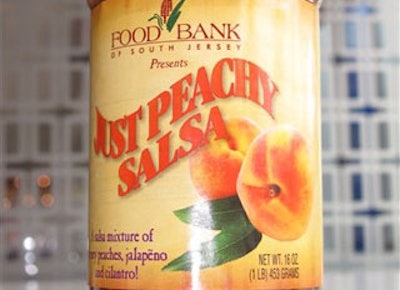
CAMDEN, N.J. (AP) — A New Jersey food bank has found a new way to try to feed the hungry and help farmers: Selling salsa.
The Food Bank of New Jersey and the Campbell Soup Co., announced the plan Wednesday, hoping it can become a model for fundraising for food banks and for innovative ways for charities and corporations to deepen their relationships.
Here's how it works: The food bank is collecting small and blemished peaches from the Eastern Propak Farmers' Cooperative of Gloucester County and taking some of them to Campbell.
The company is turning them into the featured ingredient in Just Peachy Salsa, a cooperative product being produced by Campbell using donated cilantro and other ingredients and put into donated jars. Campbell donated the recipe and the manufacturing in its small plant that's usually used to make products for testing purposes rather than for sale.
Company employees are volunteering to can and label the salsa.
From there, the food bank will sell the Just Peachy Salsa at first for $2.99 per jar through its website and at a peach festival on Saturday in Collingswood. The group is trying to line up some stores willing to sell it, too.
The partnership is planning to produce 54,000 jars of salsa this summer with the idea of raising at least $100,000 for the food bank, which has about 175,000 clients in southern New Jersey.
"It's one small little jar," said food bank CEO Val Traore, "but it's a giant step in the battle against hunger."
Food bank and Campbell officials say they believe it's the first time a food bank has sold a food product like this to raise money.
While Campbell is donating time, talent, some ingredients and even the labels, the company's name does not appear anywhere on the product's jars.
The food bank, like others in the region, is also taking whole peaches by the ton to distribute to its clients to eat whole.
That's a big help to peach farmers in New Jersey, the nation's fourth-biggest peach growing state. Anthony Yula, of Summit City Farms, a 500-acre peach and nectarine farm in Glassboro, said his wife's 90-year-old grandfather always visits the Propak cooperative and climbs up on the bins of peaches too small or soft to ship to grocery stores. "He grumbles, 'These peaches are great, so why don't they go anywhere?'" Yula said.
Jeff Danner, general manager of the cooperative, said that if food banks did not take any of its rejected peaches, it would cost $80,000 to $100,000 a year to dispose of them. The partnership with the Food Bank of South Jersey could save around $30,000, he said.


















